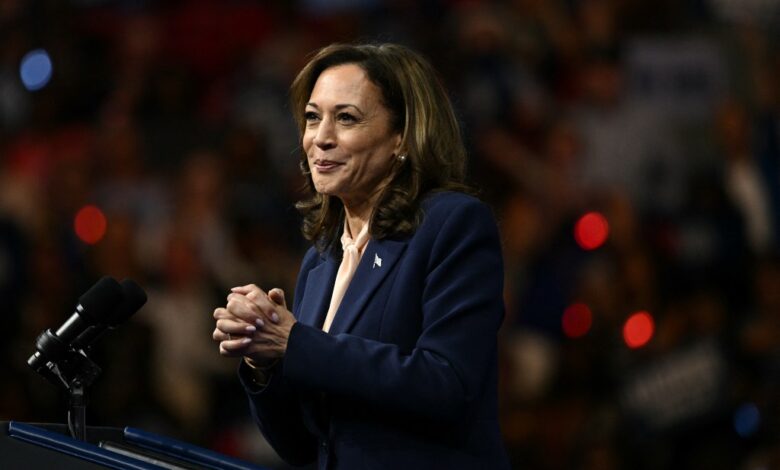Harris’ First Amendment threats as Cali AG drew liberal ire

Kamala Harris has made the Supreme Court a prime target of her presidential campaign. For her, the court’s Dobbs abortion ruling is a menacing threat — “a national movement afoot to attack hard won and hard fought freedoms.”
Yet her record as California attorney general suggests she’d be the one willing to roll back important freedoms — including the First Amendment-based expectation that we can express our opinions without being intimidated into silence if our views are unpopular.
She made that clear a decade ago when she targeted Americans for Prosperity, the free market-oriented nonprofit supported by libertarians Charles and David Koch.
Her interpretation of the law was so extreme that, incredibly, the Kochs were joined in their legal defense by two liberal bastions: the American Civil Liberties Union and the NAACP.
Harris, in other words, was too far left for the left.
Her actions as state AG should spark concern about how a President Harris — especially her administration’s Internal Revenue Service — would protect those holding views that clash with her own.
Here’s the background of the case, which Harris’ AG successor ultimately lost before the US Supreme Court.
In 2012, AG Harris moved to reinterpret a California statute requiring nonprofit charities to report the names of donors contributing more than $5,000.
There was no obvious law enforcement reason to do so; such “Schedule B” reports, including all those names, were already required by the IRS, and Harris’ predecessors had deemed that sufficient. If criminal offenses were suspected, Harris as attorney general could have subpoenaed the necessary records.
But California progressives at the time were obsessed with the influence of “dark money” — at least when it came to conservatives pushing back against the state’s high taxes and expansive government.
They wanted names.
Americans for Prosperity was concerned that revealing donor names to a hostile state agency might result in their becoming public.
They had good reason to worry: Between 2012 and 2021, as Harris and her successors doggedly continued their efforts during subsequent-court action, the state “inadvertently” posted more than 1,700 Schedule B forms on a public website.
Conservatives had already seen the personal risks that came with public disclosure of donor names in California. The state’s requirement for public reporting of contributions to political campaigns or referendum drives had made that clear.
In 2008, a public shaming campaign spotlighted the identities of those who had financially supported Proposition 8, a ballot referendum that, when it passed, briefly banned gay marriage in California.
Disclosure of his $1,000 donation was used to force the 2014 resignation of Mozilla CEO Brendan Eich, unceremoniously ousted from the company he helped to launch in the key role as chief technical officer.
Even small business owners who had supported the referendum for religious reasons faced blowback. The owner of a Sacramento dairy told NPR that he “soon started getting very nasty e-mails and letters and phone calls by the hundreds” after being outed as a Prop 8 donor.
Leaks of the names of charitable donors would expand those risks. The fear of one’s name and address becoming public would, as the ACLU would put it, “infringe on associational privacy” and threaten First Amendment rights.
In opposing the Koch-ACLU-NAACP lawsuit in federal court, Harris had to brush off a chilling federal judicial precedent, one involving the threat of racial violence.
In 1958, the Supreme Court acted to protect the NAACP from disclosing its membership lists in the landmark NAACP v. Alabama.
In a unanimous decision, the justices ruled that publishing the organization’s membership list would “likely interfere with the free association of its members” — not to mention, in Jim Crow Alabama, expose its members to the threat of lynching.
Six decades later, in 2021, Chief Justice John Roberts cited that precedent to rule against Harris’ argument. Her “promise of confidentiality was illusory,” Roberts wrote in his 6-3 majority opinion.
Here’s a chilling thought: a Harris administration as lax as her California office was in protecting the names of millions of donors to right-of-center causes.
Such records are currently held by the IRS — which of course has already failed to protect the personal tax records of wealthy Americans like Citadel’s Ken Griffin, who have found themselves demonized by the left-wing ProPublica in stories based on illegally leaked tax returns.
Kamala Harris’ campaign for the presidency brings new attention to her record as a law enforcement official in California, where she exercised executive power.
Her key role in seeking to disclose the names of conservative donors reveals her hypocrisy about the right to privacy, at least in matters other than abortion — and her ruthless willingness to wield government authority against her opponents.
Howard Husock is an American Enterprise Institute senior fellow and the author of “The Poor Side of Town — And Why We Need It.”




